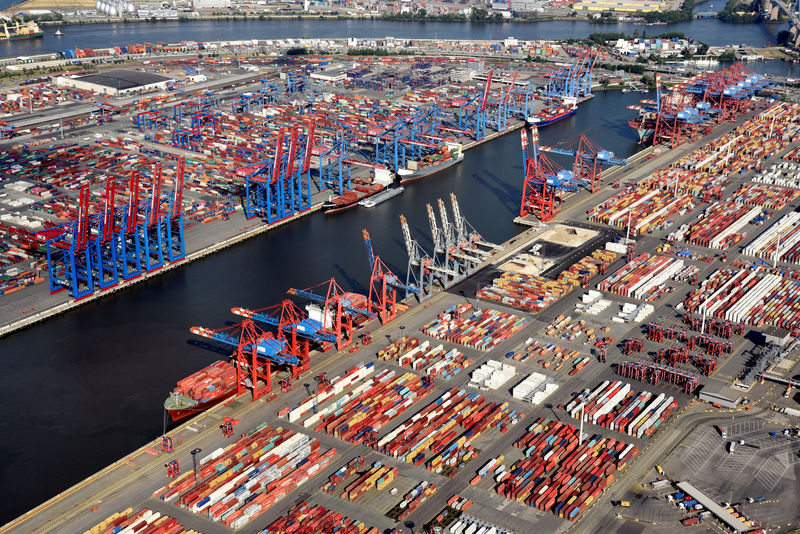By Michael Nienaber
BERLIN (Reuters) - Momentum in German exports slowed in the first half of 2019 and abruptly reversed in June, data showed on Friday, adding to signs of broad-based weakness in an economy increasingly relying on domestic demand to eke out even meagre growth.
A global growth slowdown accompanied by tariff disputes and uncertainty over Brexit has impacted growth across western Europe, but Germany's traditionally export-reliant economy - the continent's largest - has been particularly vulnerable.
Those headwinds have been offset by stimulus at home, where record-high employment, inflation-busting wage hikes and low borrowing costs have driven a consumer and construction boom.
However, that may not prevent German GDP - for which preliminary data is due on Wednesday - from joining the continent's second largest economy Britain in having contracted in the three months to June.
Reflecting the foreign/domestic split, Germany's trade surplus narrowed to 109.9 billion euros (£101.35 billion) from 122.4 billion in the half year to June as imports rose 3.0% and export growth slowed to 0.5% from the previous six months, Federal Statistics Office data showed on Friday.
In June, exports fell 0.1% from May while year on year they plunged 8% to mark their steepest rate of annual decline in nearly three years - and the DIHK business association said it expected exports to nearly stagnate in 2019 as a whole.
"Rising protectionism and a noticeably weakening global economy are burdening Germany's export-reliant economy," DIHK economist Volker Treier said.
"The U.S. trade dispute with China and the tenacious struggle for Brexit are unsettling investors worldwide and clouding the prospects for German producers of capital goods in particular."
TRIPLE WHAMMY
June also marked a potential watershed for industrial output in both Germany and in Europe's third largest economy, France.
German output fell 1.5% from May, data showed on Wednesday, while corresponding figures from France on Friday showed a drop of 2.3%. Both readings were weaker than expected .
Both countries' export sectors - including their high-profile car industries - have been hit by flagging demand from China, the world's number two economy, as its trade dispute with the United States has deepened.
"We no longer expect the Chinese government to significantly boost its stimulus package," Commerzbank (DE:CBKG) economist Joerg Kraemer said. "Instead, it accepts the growth loss that comes with the trade war."
Citing weaker demand from emerging markets and from China in particular, the bank's economic research team cut its 2020 growth forecast for the German economy to 0.8% from 1.3% previously.
Carsten Brzeski, from ING-Diba, said the weak export figures had made a small second quarter economic contraction more likely.
That would put in on an equal footing with Britain, whose economy unexpectedly shrank for the first time since 2012 in the second quarter, in a severe hangover from a pre-Brexit stockpiling boost in early 2019 that bodes ill as the country prepares to leave the EU on Oct. 31.
DEBT STIMULUS?
For Germany, another form of domestic stimulus under consideration is an increase in sovereign debt issuance.
In a sign that Berlin is willing to do more and reduce its trade and current account surpluses, a senior government official told Reuters on Thursday that it is considering ditching its long-standing balanced budget policy to help finance a costly climate protection programme with new bonds.
The International Monetary Fund and the European Commission have long urged Germany to do more to lift domestic demand as a way to boost imports, stimulate growth elsewhere and reduce global economic imbalances.
The half-year current account surplus, which measures the flow of goods, services and investments, fell to 126.4 billion euros from 130.6 billion, Friday's data showed.
But that still left it above the European Commission's indicative threshold of 6 percent of gross domestic product, where it has stood since 2011.
